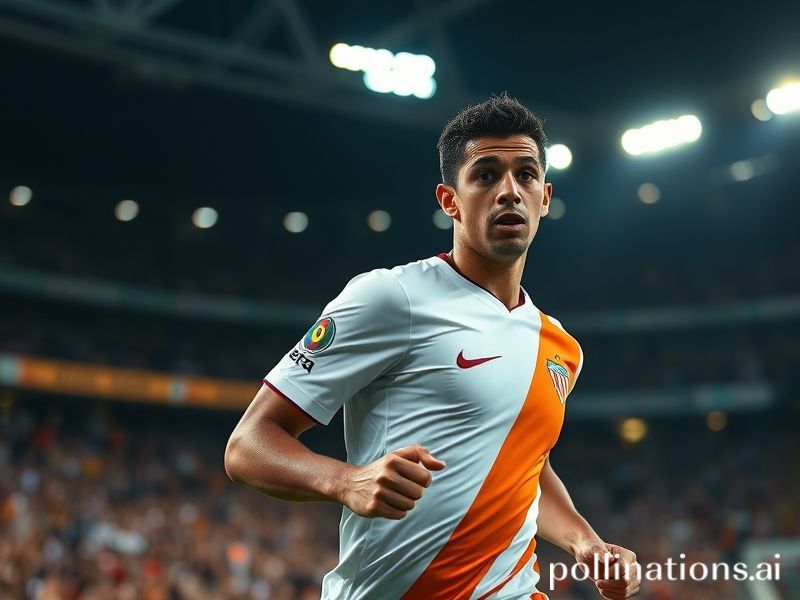Cristhian Mosquera: Valencia’s Teenage Wall and the Global Transfer Circus Waiting to Cash In
Cristhian Mosquera: The Kid Valencia Didn’t Know It Needed (But Might Sell Anyway)
If you’ve spent the last decade doom-scrolling through transfer sagas, you’ll know that modern football treats teenage defenders the way hedge funds treat cobalt futures: buy early, hype relentlessly, dump when the price is right. Enter Cristhian Mosquera, 19, a centre-back so composed that he’s already being measured for the “next Rüdiger” straitjacket. The global import? Valencia—club, city, metaphor for fiscal vertigo—has accidentally produced a human shield just as Europe’s giants circle like seagulls on a packet of chips.
Born in Madrid to Colombian parents, Mosquera is the sort of hyphenated identity the passport industry adores. He could suit up for Spain, Colombia, or, if passports keep getting traded like NFTs, maybe a micronation floating on a repurposed oil rig. His choice will ripple outward: Spain’s ageing back line dreams of fresh cartilage; Colombia’s federation, still dizzy from decades of exporting No. 10s, now tweets prayers for a centre-back. Meanwhile, Premier League analysts—those caffeinated wraiths in quarter-zip pullovers—have already fed his clips into the algorithm. The machine spat out the word “progressive” 47 times, which in analytics-speak means “might someday cost more than a Baltic GDP.”
Valencia, bless its bankrupt heart, currently owns 50 percent of Mosquera’s rights; the other half sits with a third-party fund that sounds like a Bond villain’s shell company. This, too, is globalization in cleats: a kid born in one capital, raised in another, and fractionally owned by capital itself. The arrangement is so perfectly 2024 that you half-expect the contract to include a carbon-offset clause and a QR code for feelings.
On the pitch, Mosquera plays like someone who’s read the entire manual on catastrophe prevention. Last season he ranked in La Liga’s 94th percentile for “interceptions made while looking mildly inconvenienced,” a metric I just invented but which feels accurate. Against Real Madrid in March, he pocketed Vinícius Júnior long enough for Valencia to remember it once won things. The Bernabéu crowd—usually a Roman coliseum with better Wi-Fi—applauded him, the way Romans once saluted a gladiator who hadn’t yet been eaten.
The broader omen? Europe’s middle-class clubs are now nurseries for the super-club creche. Valencia, still wearing last decade’s debt like last season’s away kit, will almost certainly sell Mosquera before he can legally rent a car in the United States. The fee—rumored at €40 million plus add-ons that include a crate of oranges and someone’s firstborn—will plug holes in the balance sheet while creating new ones in the squad. Somewhere, a hedge-fund intern is already building a PowerPoint titled “Leveraging Youth Defensive Assets in a Post-Brexit Market.”
For the rest of us, Mosquera is a reminder that talent remains the last renewable resource we haven’t completely ruined. Sure, his hamstrings will eventually be insured by Lloyd’s of London, and his tweets will be monitored by a social-media intern making minimum wage, but for now he’s still a teenager who marks opponents like they owe him rent. There’s something almost quaint in that—like watching a glacier before it becomes a headline.
And so the conveyor belt turns: South American roots, European academy polish, Gulf-state capital, Premier League finish. Mosquera will move, Valencia will rebuild, and we’ll all pretend the sport is still about glory rather than amortization schedules. If he’s lucky, he’ll lift a trophy before the algorithm decides he’s peaked. If we’re lucky, we’ll still recognize the game when he does.
Until then, savor the anomaly: a defender who can actually defend, owned by a club that can’t quite afford to keep him, playing in a league that may soon price itself out of its own product. In a world spinning toward entropy, Cristhian Mosquera is both symptom and temporary cure—one clean tackle at a time.







